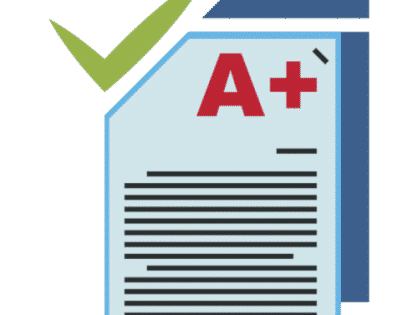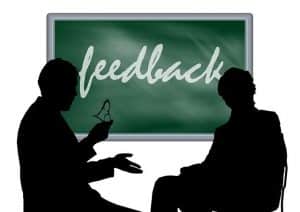Law school exam grading is one of the least transparent aspects of the law school experience. A student takes an exam and then weeks or months later gets a grade. But a grade without feedback from their professor. They will never discover why they received the grade, and almost certainly no help on improving.
 Holistic Grading
Holistic Grading
The traditional law school exam grading method is holistic grading. This is where the professor reads the exam and assigns a grade based on the professor’s past grading experience. For example, the professor decides that “this exam is an A and the other one is a C.” Thankfully, very few professors grade using this method.
Analytic Grading
The most common form of law school exam grading is analytic grading. The professor creates a grading sheet, where points are assigned for discussing certain issues. For example, on a Torts exam, there may be 1 to 5 points for Breach of Duty. The professor will then decide, after reading each exam, whether the student gets 1, 2, 3, 4, or 5 points for Breach of Duty. While this approach is better than pure holistic grading, in practice, most professors are still grading holistically as there are no written criteria for each issue. A true analytic grading sheet, which some professors use, have written criteria in assigning points. For example, a 5 might be given for “rule statements that clearly identified the law and connected the correct facts to the law.”
Feedback
Many law professors don’t provide good feedback for several reasons. First, many are not rewarded by their law schools for teaching. They are not required to meet with their students or help them improve their exam skills. Most law schools reward professors that write scholarly articles that get published in top journals. And for many professors, that means spending time writing and not helping students. A friend of mine was visiting at a top 50 law school and he shared this story with me. His office was next to a faculty member who was always busy writing. This faculty member always kept his door closed and locked, so that he could spend time writing. When students knocked on his door, the students were ignored. Even though the faculty member was inside his office and the students desperately wanted help. This faculty member understood that his top 50 law school rewarded scholarship over teaching. While this story is disturbing, it is all too common at many law schools.
Professors Not Trained in Feedback Techniques
Another reason that professors don’t provide meaningful feedback is because the professor hasn’t spent the time learning how to provide good feedback. For almost every law professor, grading is the least desirable part of the job–who really wants to grade a hundred essays in three weeks. This means that many professors use checklists in assigning grades. For example, a professor grading a 4th Amendment exam might have something like this on her spreadsheet: Police are legally allowed to observe Joe on public street (2 points); Police may stop Joe and ask him a quick question (3 points); Police may pat down Joe for weapons (5 points). And with that checklist, if you are ever allowed to see it, you see that you got 2 points, 2 points, and 3 points.
But that kind of information is almost worthless because you don’t know WHY the professor assigned those points to you. Suppose that you do meet with your professor and you ask her why she gave you 3 points for an issue, you are likely going to get a response like this: “you need to have a stronger rule statement and your analysis could have been stronger.” That is a conclusion that does not really help you for the next exam, and you are likely to continue making the same errors on future exams.
Meaningful Feedback
What every law student needs is meaningful feedback and a plan to improve. From day one I have worked hard at trying to help students improve, but I did a poor job during my first few years of teaching. At first, I would meet with students for about half an hour and go through their exam with them, line by line. That sounds good, but it didn’t work. Then I had shorter meetings and provided students with resources to improve, and that didn’t work either. Over the last few years I came to realize that students don’t improve because they don’t really understand what law school essay exams are really about. Most students believe that an essay exam grade is based on their understanding of the material. That is a profound misunderstanding of the law school essay exam!
Students need more than the law. They also need to use the IRAC Method for organizing their exams. After meeting with many students, especially those that got the lowest grades, I came to realize that they knew the material. If I had given them an oral exam they would have received high grades, not low grades. This taught me that students don’t know HOW to write an answer that makes sense to professors and bar examiners. So once you get your grade, make an appointment with your professor.
Empowering Students
Ideally, feedback should be designed to help students become self-reflective learners. This will allow them to see the patterns embedded in future law school or bar exams. Let me tell you about Henry (not his real name), who was in the first group of students that I worked with using my self-reflection method. Henry got one of the lowest grades on the midterm exam. He was devastated and came to me for help as he did not understand how he could have received this low grade. Rather than telling him what he did wrong, I provided him with some tools so that he could use to self-diagnose his midterm exam. He then spent hours using those tools, and on the final exam received the second highest grade in the class. That was an epiphany for me. I now follow the old saying: give a person a fish, they eat for a day. But teach them to fish then they eat for a lifetime.
You can significantly improve your writing if you stop expecting line-by-line debriefs of your answers. Instead, become a self-reflective learner. It’s hard at first because most students have never done it. It’s also time consuming, which stops many students because they don’t see the value behind the method. But once you go down this path it will help you become a better writer and thinker. For more information on this method please check out our exam grading page.



